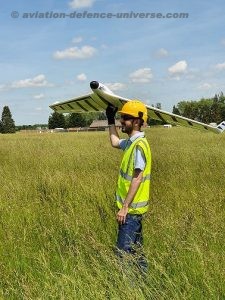
London. 17 September 2021. Following a successful initial DASA contract to prove the concept of true autonomy in drones, Flare Bright have been awarded a larger follow-up contract to provide the same autonomy in powered drones to give increase persistence and endurance. This project will deliver a fixed wing drone that can fly without GPS or any remote-control, when other drones are unflyable due to jamming and denial.
Flare Bright’s latest £425,391 contract lasts for 13 months and recently commenced, and follows on from the completion of an initial £226,500 contract that successfully concluded in April 2021. It will be announced at DSEI, to coincide with Flare Bright being selected to showcase its success at DASA’s stand (H2-110) and representatives will be talking through the innovative technology throughout the show.
The military is increasingly using drones. GPS will often be denied and spoofed, and electromagnetic communication used for remote control will be jammed. Drones typically have an unsophisticated approach to dealing with jamming, outages or failure. Flare Bright has developed the technology to develop a truly autonomous drone that doesn’t rely on any of these methods and uses un-jammable internal means of flight control and navigation.
Flare Bright’s existing autonomous gliding drone has proven this and has now been selected by the US Army Expeditionary Warrior Experiment and has been promoted on the UK Government’s website as a Case Study.
Flare Bright aims to extend its proven autonomous flight system’s persistence to perform a mission for 5-10 minutes without GPS or any other communications in a fixed-wing powered drone.
Any military would like to develop a truly autonomous drone that doesn’t rely on GPS or remote control and just uses unjammable internal means of flight control and navigation. As DASA itself states, “The UK Defence and Security sector has demanding requirements for accurate and resilient Position, Navigation and Timing (PNT). When Global Navigation Satellite Systems (GNSS) are either absent, denied, degraded or unreliable, a platform’s Inertial Navigation System (INS) will drift; PNT uncertainty will grow, and mission success may be compromised. As the future operational environment becomes increasingly congested, cluttered, connected and constrained, advances in current navigation technologies will be required to avoid mission failure.” This project will achieve the next level of practical development in this area.
John Binns, the recently retired Deputy Director of Strategy for the MOD Test and Evaluation team stated, “From my engagement with FlareBright, following a TechUK Defence Test and Evaluation conference, I have been increasingly impressed by their innovative methods by which they use machine learning and AI coupled with synthetic environments to rapidly test and prototype their autonomous SnapShot system validated by short duration live trial data.

I believe the innovation shown by FlareBright in their testing and prototyping has the potential to provide Defence with the ability to accelerate the development of unmanned and autonomous systems and have supported your efforts by providing opportunities to present their innovative technique to FLC’s at the Test & Evaluation Futures Programme Board.”
Former Paratrooper and Flare Bright’s Chief Commercial Officer, Chris Daniels said, “Every soldier knows that instant, tactical aerial surveillance is vital on any operation. To provide this to front line soldiers in a super lightweight form, with no training needed, and that can work in any challenging environment has to be good news for soldier survivability. We’re delighted we’re helping out.”





















































































































